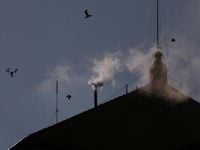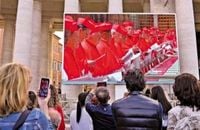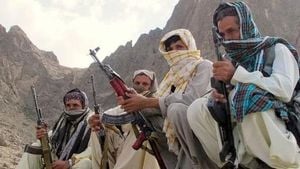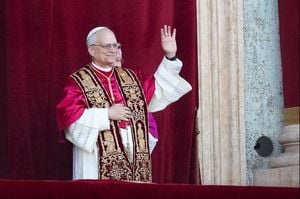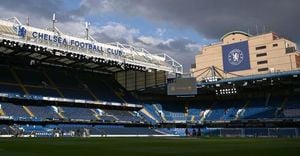On May 8, 2025, the election for a new Roman Catholic Pope remains ongoing as black smoke billows from the chimney of the Sistine Chapel, indicating that no decision has been reached after two rounds of voting. This conclave follows the death of Pope Francis last month, and it is expected that a new pope will be elected within 15 to 20 days. A total of 133 cardinals have gathered in Vatican City for this closed-door election, and many believers from around the world have flocked to St. Peter's Square, eagerly awaiting the outcome.
Wednesday's voting did not yield a new pope, and as the cardinals reconvene on Thursday afternoon, they will hold two additional rounds of voting. The process may continue in the coming days until a candidate secures at least a two-thirds majority. If a new pope is elected, white smoke will signal the decision to the thousands gathered outside.
Modern papal conclaves tend to be brief, with the previous elections of Pope Benedict XVI and Pope Francis both concluding within two days. Some cardinals have expressed hope that the election could wrap up by Thursday or Friday, allowing for a swift transition for the church, which serves approximately 1.4 billion members globally.
As the world watches, speculation grows about who the next pope might be. Among the 23 cardinal electors from Asia, several candidates are viewed as having strong prospects for election. Cardinal Luis Antonio Tagle, 67, from the Philippines, is considered one of the leading contenders. Having served as head of the Vatican's missionary organization for the past five years, Tagle's election would likely continue the modernization and progressive reforms initiated by Pope Francis.
Tagle hails from a country where nearly 80% of the population, or about 93 million people, are Catholic. His leadership style and vision align closely with the current needs of the church, particularly in addressing social issues and humanitarian concerns.
Another prominent candidate is Cardinal Tarcisio Isao Kikuchi, 66, who is known for his strong advocacy for humanitarian causes and his emphasis on climate change as a pressing issue for Asia, particularly affecting the poorest populations. Kikuchi shares Pope Francis's views on immigration and advocates for solutions to contemporary societal challenges.
On the other hand, Cardinal Albert Malcolm Ranjith, 77, presents a contrasting perspective. A conservative figure fluent in ten languages, Ranjith has openly opposed issues such as same-sex marriage, euthanasia, and abortion. His potential election could signal a return to a more traditional and conservative papacy, reminiscent of Pope Benedict XVI.
Cardinal Joseph Coutts, 79, the retired Archbishop of Karachi, Pakistan, is another candidate, though his age and retirement status make him less likely to be elected. In Pakistan, Christians represent only about 3% of the population, and as a persecuted minority, they face significant challenges.
Cardinal Charles Maung Bo, the only cardinal from Myanmar, was appointed by Pope Francis in 2015. At 76, Bo typically refrains from discussing the liberal issues championed by his predecessor, focusing instead on the pressing matters that affect his nation, which has been under military rule.
Cardinal Lazarus You Heung-sik, 73, from South Korea, also stands as a candidate. As the Cardinal Archbishop of Daejeon, he has served in various roles promoting peace and reconciliation, particularly in relation to North Korea. With about 31% of South Korea's population identifying as Christian, his leadership could resonate well within the region.
Lastly, Cardinal Dominique Joseph Mathieu, 62, is noteworthy as the first cardinal from Iran. Leading the Isfahan Diocese since December 2024, he operates in a challenging environment where Catholicism is allowed, but proselytizing and converting from Islam can lead to severe repercussions.
As the cardinals continue to deliberate, the global Catholic community remains hopeful for a new leader who can guide the church through its many challenges. The election of a new pope is not just a pivotal moment for the church but also a significant event for millions of Catholics worldwide who look to the papacy for spiritual guidance and leadership.
In the coming days, the anticipation will only grow as the cardinals seek to reach a consensus on their next leader. With the world watching closely, each round of voting will bring the church one step closer to determining its future direction and the legacy of its new pope.
